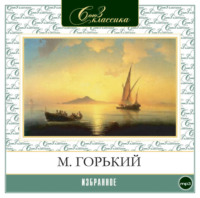 полная версия
полная версияThe Man Who Was Afraid
“Why are they gobbling here? Is this a tavern?” cried Foma, angrily.
“Hush,” Mayakin remarked with fright and hastily turned to look around with a kind smile on his face.
But it was too late; his smile was of no avail. Foma’s words had been overheard, the noise and the talk was subsiding, some of the guests began to bustle about hurriedly, others, offended, frowned, put down their forks and knives and walked away from the table, all looking at Foma askance.
Silent and angry, he met these glances without lowering his eyes.
“I ask you to come up to the table!” cried Mayakin, gleaming amid the crowd of people like an ember amid ashes. “Be seated, pray! They’re soon serving pancakes.”
Foma shrugged his shoulders and walked off toward the door, saying aloud:
“I shall not eat.”
He heard a hostile rumbling behind him and his godfather’s wheedling voice saying to somebody:
“It’s for grief. Ignat was at once father and mother to him.”
Foma came out in the garden and sat down on the same place where his father had died. The feeling of loneliness and grief oppressed his heart. He unbuttoned the collar of his shirt to make his breathing easier, rested his elbows on the table, and with his head tightly pressed between his hands, he sat motionless. It was drizzling and the leaves of the apple-tree were rustling mournfully under the drops of the rain. He sat there for a long time alone, motionless, watching how the small drops were falling from the apple-tree. His head was heavy from the vodka, and in his heart there was a growing grudge against men. Some indefinite, impersonal feelings and thoughts were springing up and vanishing within him; before him flashed the bald skull of his godfather with a little crown of silver hair and with a dark face, which resembled the faces of the ancient ikons. This face with the toothless mouth and the malicious smile, rousing in Foma hatred and fear, augmented in him the consciousness of solitude. Then he recalled the kind eyes of Medinskaya and her small, graceful figure; and beside her arose the tall, robust, and rosy-cheeked Lubov Mayakina with smiling eyes and with a big light golden-coloured braid. “Do not rely upon men, expect but little at their hands” – his father’s words began to ring in his memory. He sighed sadly and cast a glance around him. The tree leaves were fluttering from the rain, and the air was full of mournful sounds. The gray sky seemed as though weeping, and on the trees cold tears were trembling. And Foma’s soul was dry, dark; it was filled with a painful feeling of orphanhood. But this feeling gave birth to the question:
“How shall I live now that I am alone?”
The rain drenched his clothes, and when he felt that he was shivering with cold he arose and went into the house.
Life was tugging him from all sides, giving him no chance to be concentrated in thinking of and grieving for his father, and on the fortieth day after Ignat’s death Foma, attired in holiday clothes, with a pleasant feeling in his heart, went to the ceremony of the corner-stone laying of the lodging-asylum. Medinskaya notified him in a letter the day before, that he had been elected as a member of the building committee and also as honorary member of the society of which she was president. This pleased him and he was greatly agitated by the part he was to play today at the laying of the corner-stone. On his way he thought of how everything would be and how he should behave in order not to be confused before the people.
“Eh, eh! Hold on!”
He turned around. Mayakin came hastening to him from the sidewalk. He was in a frock-coat that reached his heels, in a high cap, and he carried a huge umbrella in his hand.
“Come on, take me up there,” said the old man, cleverly jumping into the carriage like a monkey. “To tell the truth, I was waiting for you. I was looking around, thinking it was time for you to go.”
“Are you going there?” asked Foma.
“Of course! I must see how they will bury my friend’s money in the ground.”
Foma looked at him askance and was silent. “Why do you frown upon me? Don’t fear, you will also start out as a benefactor among men.”
“What do you mean?” asked Foma, reservedly. “I’ve read in the newspaper this morning that you were elected as a member of the building committee and also as an honorary member of Sophya’s society.”
“Yes.”
“This membership will eat into your pocket!” sighed Mayakin.
“That wouldn’t ruin me.”
“I don’t know it,” observed the old man, maliciously.
“I speak of this more because there is altogether very little wisdom in this charity business, and I may even say that it isn’t a business at all, but simply harmful nonsense.”
“Is it harmful to aid people?” asked Foma, hotly.
“Eh, you cabbage head!” said Mayakin with a smile. “You had better come up to my house, I’ll open your eyes in regard to this. I must teach you! Will you come?”
“Very well, I will come!” replied Foma.
“So. And in the meantime, hold yourself proud at the laying of the corner-stone. Stand in view of everybody. If I don’t tell this to you, you might hide yourself behind somebody’s back.”
“Why should I hide myself?” said Foma, displeased.
“That’s just what I say: there is no reason why. For the money was donated by your father and you are entitled to the honour as his heir. Honour is just the same as money. With honour a business man will get credit everywhere, and everywhere there is a way open to him. Then come forward, so that everybody may see you and that if you do five copecks’ worth of work, you should get a rouble in return for it. And if you will hide yourself – nothing but foolishness will be the result.”
They arrived at their destination, where all the important people had gathered already, and an enormous crowd of people surrounded the piles of wood, bricks and earth. The bishop, the governor, the representatives of the city’s aristocracy and the administration formed, together with the splendidly dressed ladies, a big bright group and looked at the efforts of the two stonemasons, who were preparing the bricks and the lime. Mayakin and his godson wended their way toward this group. He whispered to Foma:
“Lose no courage, these people have robbed their bellies to cover themselves with silk.”
And he greeted the governor before the bishop, in a respectfully cheerful voice.
“How do you do, your Excellency? Give me your blessing, your Holiness!”
“Ah, Yakov Tarasovich!” exclaimed the governor with a friendly smile, shaking and squeezing Mayakin’s hand, while the old man was at the same time kissing the bishop’s hand. “How are you, deathless old man?”
“I thank you humbly, your Excellency! My respects to Sophya Pavlovna!” Mayakin spoke fast, whirling like a peg-top amid the crowd of people. In a minute he managed to shake hands with the presiding justice of the court, with the prosecutor, with the mayor – in a word, with all those people whom he considered it necessary to greet first; such as these, however, were few. He jested, smiled and at once attracted everybody’s attention to his little figure, and Foma with downcast head stood behind him, looking askance at these people wrapped in costly stuffs, embroidered with gold; he envied the old man’s adroitness and lost his courage, and feeling that he was losing his courage – he grew still more timid. But now Mayakin seized him by the hand and drew him up to himself.
“There, your Excellency, this is my godson, Foma, the late Ignat’s only son.”
“Ah!” said the governor in his basso, “I’m very pleased. I sympathise with you in your misfortune, young man!” he said, shaking Foma’s hand, and became silent; then he added resolutely and confidently: “To lose a father, that is a very painful misfortune.”
And, having waited about two seconds for Foma’s answer, he turned away from him, addressing Mayakin approvingly:
“I am delighted with the speech you made yesterday in the city hall! Beautiful, clever, Yakov Tarasovich. Proposing to use the money for this public club, they do not understand the real needs of the population.”
“And then, your Excellency, a small capital means that the city will have to add its own money.”
“Perfectly true! Perfectly true!”
“Temperance, I say, is good! Would to God that all were sober! I don’t drink, either, but what is the use of these performances, libraries and all that, since the people cannot even read?”
The governor replied approvingly.
“Here, I say, you better use this money for a technical institution. If it should be established on a small plan, this money alone will suffice, and in case it shouldn’t, we can ask for more in St. Petersburg – they’ll give it to us. Then the city wouldn’t have to add of its own money, and the whole affair would be more sensible.”
“Precisely! I fully agree with you! But how the liberals began to cry at you! Eh? Ha, ha!”
“That has always been their business, to cry.”
The deep cough of the archdeacon of the cathedral announced the beginning of the divine service.
Sophya Pavlovna came up to Foma, greeted him and said in a sad, low voice:
“I looked at your face on the day of the funeral, and my heart saddened. My God, I thought, how he must suffer!”
And Foma listened to her and felt as though he was drinking honey.
“These cries of yours, they shook my soul, my poor child! I may speak to you this way, for I am an old woman already.”
“You!” exclaimed Foma, softly.
“Isn’t that so?” she asked, naively looking into his face.
Foma was silent, his head bent on his breast.
“Don’t you believe that I am an old woman?”
“I believe you; that is, I believe everything you may say; only this is not true!” said Foma, feelingly, in a low voice.
“What is not true? What do you believe me?”
“No! not this, but that. I – excuse me! I cannot speak!” said Foma, sadly, all aflush with confusion. “I am not cultured.”
“You need not trouble yourself on this account,” said Medinskaya, patronisingly. “You are so young, and education is accessible to everybody. But there are people to whom education is not only unnecessary, but who can also be harmed by it. Those that are pure of heart, sanguine, sincere, like children, and you are of those people. You are, are you not?”
What could Foma say in answer to this question? He said sincerely:
“I thank you humbly!”
And noticing that his words called forth a gay gleam in Medinskaya’s eyes, Foma appeared ridiculous and stupid in his own eyes; he immediately became angry at himself and said in a muffled voice:
“Yes, I am such. I always speak my mind. I cannot deceive. If I see something to laugh at, I laugh openly. I am stupid!”
“What makes you speak that way?” said the woman, reproachfully, and adjusting her dress, she accidentally stroked Foma’s hand, in which he held his hat. This made him look at his wrist and smile joyously and confusedly.
“You will surely be present at the dinner, won’t you?” asked Medinskaya.
“Yes.”
“And tomorrow at the meeting in my house?”
“Without fail!”
“And perhaps sometime you will drop in, simply on a visit, wouldn’t you?”
“I – I thank you! I’ll come!”
“I must thank you for the promise.”
They became silent. In the air soared the reverently soft voice of the bishop, who recited the prayer expressively, outstretching his hand over the place where the corner-stone of the house was laid:
“May neither the wind, nor water, nor anything else bring harm unto it; may it be completed in thy benevolence, and free all those that are to live in it from all kinds of calumny.”
“How rich and beautiful our prayers are, are they not?” asked Medinskaya.
“Yes,” said Foma, shortly, without understanding her words and feeling that he was blushing again.
“They will always be opponents of our commercial interests,” Mayakin whispered loudly and convincingly, standing beside the city mayor, not far from Foma. “What is it to them? All they want is somehow to deserve the approval of the newspaper. But they cannot reach the main point. They live for mere display, not for the organisation of life; these are their only measures: the newspapers and Sweden! [Mayakin speaks of Sweden, meaning Switzerland. – Translator’s note.] The doctor scoffed at me all day yesterday with this Sweden. The public education, says he, in Sweden, and everything else there is first-class! But what is Sweden, anyway? It may be that Sweden is but a fib, is but used as an example, and that there is no education whatever or any of the other things there. And then, we don’t live for the sake of Sweden, and Sweden cannot put us to test. We have to make our lip according to our own last. Isn’t it so?”
And the archdeacon droned, his head thrown back:
“Eternal me-emo-ory to the founder of this ho-ouse!”
Foma shuddered, but Mayakin was already by his side, and pulling him by the sleeve, asked:
“Are you going to the dinner?”
And Medinskaya’s velvet-like, warm little hand glided once more over Foma’s hand.
The dinner was to Foma a real torture. For the first time in his life among these uniformed people, he saw that they were eating and speaking – doing everything better than he, and he felt that between him and Medinskaya, who was seated just opposite him, was a high mountain, not a table. Beside him sat the secretary of the society of which Foma had been made an honorary member; he was a young court officer, bearing the odd name of Ookhtishchev. As if to make his name appear more absurd than it really was, he spoke in a loud, ringing tenor, and altogether – plump, short, round-faced and a lively talker – he looked like a brand new bell.
“The very best thing in our society is the patroness; the most reasonable is what we are doing – courting the patroness; the most difficult is to tell the patroness such a compliment as would satisfy her; and the most sensible thing is to admire the patroness silently and hopelessly. So that in reality, you are a member not of ‘the Society of Solicitude,’ and so on, but of the Society of Tantaluses, which is composed of persons bent on pleasing Sophya Medinskaya.”
Foma listened to his chatter, now and then looking at the patroness, who was absorbed in a conversation with the chief of the police; Foma roared in reply to his interlocutor, pretending to be busy eating, and he wished that all this would end the sooner. He felt that he was wretched, stupid, ridiculous and he was certain that everybody was watching and censuring him. This tied him with invisible shackles, thus checking his words and his thoughts. At last he went so far, that the line of various physiognomies, stretched out by the table opposite him, seemed to him a long and wavy white strip besprinkled with laughing eyes, and all these eyes were pricking him unpleasantly and painfully.
Mayakin sat near the city mayor, waved his fork in the air quickly, and kept on talking all the time, now contracting, now expanding the wrinkles of his face. The mayor, a gray-headed, red-faced, short-necked man, stared at him like a bull, with obstinate attention and at times he rapped on the edge of the table with his big finger affirmatively. The animated talk and laughter drowned his godfather’s bold speech, and Foma was unable to hear a single word of it, much more so that the tenor of the secretary was unceasingly ringing in his ears:
“Look, there, the archdeacon arose; he is filling his lungs with air; he will soon proclaim an eternal memory for Ignat Matveyich.”
“May I not go away?” asked Foma in a low voice.
“Why not? Everybody will understand this.”
The deacon’s resounding voice drowned and seemed to have crushed the noise in the hail; the eminent merchants fixed their eyes on the big, wide-open mouth, from which a deep sound was streaming forth, and availing himself of this moment, Foma arose from his seat and left the hall.
After awhile he breathed freely and, sitting in his cab, thought sadly that there was no place for him amid these people. Inwardly, he called them polished. He did not like their brilliancy, their faces, their smiles or their words, but the freedom and the cleverness of their movements, their ability to speak much and on any subject, their pretty costumes – all this aroused in him a mixture of envy and respect for them. He felt sad and oppressed at the consciousness of being unable to talk so much and so fluently as all these people, and here he recalled that Luba Mayakina had more than once scoffed at him on this account.
Foma did not like Mayakin’s daughter, and since he had learned from his father of Mayakin’s intention to marry him to Luba, the young Gordyeeff began to shun her. But after his father’s death he was almost every day at the Mayakins, and somehow Luba said to him one day:
“I am looking at you, and, do you know? – you do not resemble a merchant at all.”
“Nor do you look like a merchant’s daughter,” said Foma, and looked at her suspiciously. He did not understand the meaning of her words; did she mean to offend him, or did she say these words without any kind thoughts?
“Thank God for this!” said she and smiled to him a kind, friendly smile.
“What makes you so glad?” he asked.
“The fact that we don’t resemble our fathers.”
Foma glanced at her in astonishment and kept silent.
“Tell me frankly,” said she, lowering her voice, “you do not love my father, do you? You don’t like him?”
“Not very much,” said Foma, slowly.
“And I dislike him very much.”
“What for?”
“For everything. When you grow wiser, you will know it yourself. Your father was a better man.”
“Of course!” said Foma, proudly.
After this conversation an attachment sprang up between them almost immediately, and growing stronger from day to day, it soon developed into friendship, though a somewhat odd friendship it was.
Though Luba was not older than her god-brother, she nevertheless treated him as an older person would treat a little boy. She spoke to him condescendingly, often jesting at his expense; her talk was always full of words which were unfamiliar to Foma; and she pronounced these words with particular emphasis and with evident satisfaction. She was especially fond of speaking about her brother Taras, whom she had never seen, but of whom she was telling such stories as would make him look like Aunt Anfisa’s brave and noble robbers. Often, when complaining of her father, she said to Foma:
“You will also be just such a skinflint.”
All this was unpleasant to the youth and stung his vanity. But at times she was straightforward, simple-minded, and particularly kind and friendly to him; then he would unburden his heart before her, and for a long time they would share each other’s thoughts and feelings.
Both spoke a great deal and spoke sincerely, but neither one understood the other; it seemed to Foma that whatever Luba had to say was foreign to him and unnecessary to her, and at the same time he clearly saw that his awkward words did not at all interest her, and that she did not care to understand them. No matter how long these conversations lasted, they gave both of them the sensation of discomfort and dissatisfaction. As if an invisible wall of perplexity had suddenly arisen and stood between them. They did not venture to touch this wall, or to tell each other that they felt it was there – they resumed their conversations, dimly conscious that there was something in each of them that might bind and unite them.
When Foma arrived at his godfather’s house, he found Luba alone. She came out to meet him, and it was evident that she was either ill or out of humour; her eyes were flashing feverishly and were surrounded with black circles. Feeling cold, she muffled herself in a warm shawl and said with a smile:
“It is good that you’ve come! For I was sitting here alone; it is lonesome – I don’t feel like going anywhere. Will you drink tea?”
“I will. What is the matter with you, are you ill?”
“Go to the dining-room, and I’ll tell them to bring the samovar,” she said, not answering his question.
He went into one of the small rooms of the house, whose two windows overlooked the garden. In the middle of the room stood an oval table, surrounded with old-fashioned, leather-covered chairs; on one partition hung a clock in a long case with a glass door, in the corner was a cupboard for dishes, and opposite the windows, by the walls, was an oaken sideboard as big as a fair-sized room.
“Are you coming from the banquet?” asked Luba, entering.
Foma nodded his head mutely.
“Well, how was it? Grand?”
“It was terrible!” Foma smiled. “I sat there as if on hot coals. They all looked there like peacocks, while I looked like a barn-owl.”
Luba was taking out dishes from the cupboard and said nothing to Foma.
“Really, why are you so sad?” asked Foma again, glancing at her gloomy face.
She turned to him and said with enthusiasm and anxiety:
“Ah, Foma! What a book I’ve read! If you could only understand it!”
“It must be a good book, since it worked you up in this way,” said Foma, smiling.
“I did not sleep. I read all night long. Just think of it: you read – and it seems to you that the gates of another kingdom are thrown open before you. And the people there are different, and their language is different, everything different! Life itself is different there.”
“I don’t like this,” said Foma, dissatisfied. “That’s all fiction, deceit; so is the theatre. The merchants are ridiculed there. Are they really so stupid? Of course! Take your father, for example.”
“The theatre and the school are one and the same, Foma,” said Luba, instructively. “The merchants used to be like this. And what deceit can there be in books?”
“Just as in fairy – tales, nothing is real.”
“You are wrong! You have read no books; how can you judge? Books are precisely real. They teach you how to live.”
“Come, come!” Foma waved his hand. “Drop it; no good will come out of your books! There, take your father, for example, does he read books? And yet he is clever! I looked at him today and envied him. His relations with everybody are so free, so clever, he has a word for each and every one. You can see at once that whatever he should desire he is sure to attain.”
“What is he striving for?” exclaimed Luba. “Nothing but money. But there are people that want happiness for all on earth, and to gain this end they work without sparing themselves; they suffer and perish! How can my father be compared with these?”
“You need not compare them. They evidently like one thing, while your father likes another.”
“They do not like anything!”
How’s that?
“They want to change everything.”
“So they do strive for something?” said Foma, thoughtfully. “They do wish for something?”
“They wish for happiness for all!” cried Luba, hotly. “I can’t understand this,” said Foma, nodding his head. “Who cares there for my happiness? And then again, what happiness can they give me, since I, myself, do not know as yet what I want? No, you should have rather looked at those that were at the banquet.”
“Those are not men!” announced Luba, categorically.
“I do not know what they are in your eyes, but you can see at once that they know their place. A clever, easy-going lot.”
“Ah, Foma!” exclaimed Luba, vexed. “You understand nothing! Nothing agitates you! You are an idler.”
“Now, that’s going too far! I’ve simply not had time enough to see where I am.”
“You are simply an empty man,” said Luba, resolutely and firmly.
“You were not within my soul,” replied Foma, calmly. “You cannot know my thoughts.”
“What is there that you should think of?” said Luba, shrugging her shoulders.
“So? First of all, I am alone. Secondly, I must live. Don’t I understand that it is altogether impossible for me to live as I am now? I do not care to be made the laughing-stock of others. I cannot even speak to people. No, nor can I think.” Foma concluded his words and smiled confusedly.
“It is necessary to read, to study,” Luba advised him convincingly, pacing up and down the room.
“Something is stirring within my soul,” Foma went on, not looking at her, as though speaking to himself; “but I cannot tell what it is. I see, for instance, that whatever my godfather says is clever and reasonable. But that does not attract me. The other people are by far more interesting to me.”
“You mean the aristocrats?” asked Luba.









